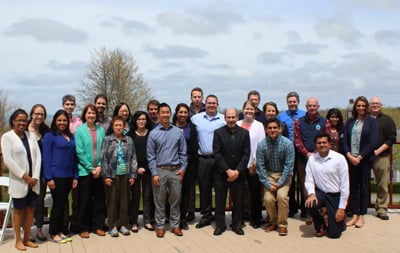 |
|
|
Sixteen rising chief residents participated in the eighth annual Chief Resident Immersion Training program. |
As the baby boomer generation continues to drive growth of the nation’s aging population, there is an evolving need for primary care physicians and specialists to be well-versed in the principles of providing high quality care to American seniors. However, there are not enough doctors trained to care for them. According to a study conducted by the Alliance for Aging Research, 33,000 geriatricians will be needed by 2030; currently, there are only 8,800 practitioners certified.
In an effort to address these growing workforce concerns, UMass Medical School recently offered its eighth annual Chief Resident Immersion Training program on Cape Cod under the direction of Randall Morse, MD, assistant professor of medicine in the Division of Geriatric Medicine, and Erika Oleson, DO, assistant professor of family medicine & community health and medicine in the Division of Geriatric Medicine. It was funded by Fallon Health.
“The overarching goal of the program aims at fostering the collaboration across disciplines in the management of complex older patients, since it takes a team approach,” Dr. Morse said. “As the only participant as a rising chief resident and faculty member, I continue to be impressed by the dedication of faculty and the engagement by participants.”
Sixteen rising chief residents participated, with representation from the specialties of internal medicine, gynecology, family medicine, psychiatry, surgery, orthopedics, neurology and cardiology. Drawing on the expertise of a diverse and multidisciplinary faculty, the program is designed to improve chief residents’ understanding of geriatric care challenges, and enhance their leadership and teaching skills through small group discussions, mini-lectures and mentoring sessions.
“Rising chiefs have not always received sufficient training in the care of older adults, but it is imperative that they have core geriatric skills,” said Jerry Gurwitz, MD, the Dr. John Meyers Professor of Primary Care Medicine, professor of medicine and family medicine & community health, and chief of the Division of Geriatric Medicine. “This program focuses on chief residents because of the key roles they play in addressing quality of care issues, medical student and resident training, and enhancing the continuum of care between health care staff, and patients and families.”
Since the program was implemented at UMMS in 2010, it has brought together 116 rising chief residents from almost all specialties and provided a powerful and positive impact on those who have participated. Each chief resident develops his or her own “action plan” to be implemented within their respective departments during the upcoming academic year.
“It was an amazing conference that not only instructed me on topics regarding geriatrics, but also provided topics in how to be a chief,” said Andrew Hsu, MD, internal medicine resident in the Department of Medicine. “I feel that often times, residents are just thrown into chief year without much instruction or training in how to deal with all the personnel issues that may arise, but this program was able to provide that training.”
“The truth is, medicine is an art that’s tailored to individual needs and populations, of which the geriatric demographic is a significant part, perhaps more so than any other time in modern history given the aging baby boomer generation,” said Kayla Behbahani, DO, resident in the Department of Psychiatry. “Learning, recognizing and appreciating the differences in diagnosing and treating these patients is not only important to delivering safe and adequate care, but also serves as a vital contribution to the national health care crisis by reducing the burden of irrelevant and unnecessary interventions.”